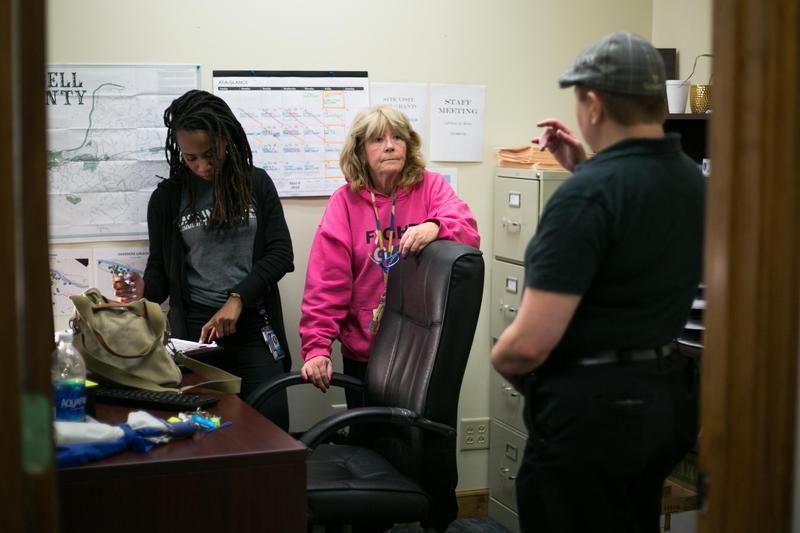Teachers across the country are going on strike after West Virginia’s teachers successfully secured raises in a standoff with state officials that shut down schools in all 55 counties last month.
The widely-covered walkout in West Virginia is pointed to as a source of inspiration and empowerment by many teachers who took to protesting last week in Kentucky, Oklahoma and Arizona.
In what one Kentucky teacher called a “wildfire” of protests spreading throughout the country in Dana Goldstein’s article in The New York Times, teachers are demanding raises and voicing opposition to cuts to already struggling school budgets.
Kentucky teachers protesting in Frankfort voiced their outrage over being kept out of the conversation on the overhaul of their pension system. Senate Bill 151 was eventually passed by the Kentucky Senate and took teachers by surprise, causing a lot of confusion, anxiety and anger.
“The process by which the legislature passed those bills the other day was so secretive that nobody knew for sure what they were protesting against. But they knew they weren’t treated well, let’s put it that way,” said Congressman John Yarmuth (KY-3) in a phone interview with 100 Days in Appalachia.
Rep. Yarmuth believes that although some of the items passed in the bill might ultimately be a positive development for the teachers, the outcome could have been very different if not for the protesters’ presence in the state capitol’s rotunda.
“When you’ve got thousands upon thousands of people yelling at you, you might be inclined to make some last minute adjustments. We don’t know if that had any impact on it, but I suspect it had some,” added the congressman.
Asked about the reason for the secretive passage of the bill, Rep. Yarmuth said that: “The only answer I have is that they don’t want people to know what’s in it.”
Among the major changes to the pension system is the introduction of a hybrid cash-balance retirement plan for teachers hired after January 1, 2019, as well as an increase in the required number of years on the job needed before acquiring the right to retire and the inability to accumulate sick days towards retirement. The bill also ends the inviolable contract for newly hired teachers, meaning that state legislators will be able to change the retirement plan moving forward.
Some of the proposed changes that were opposed by teachers, like cuts to annual cost-of-living increases, or additional contributions to health insurance, were ultimately kept out of the bill.
Kentucky’s Republicans framed the bill as a necessary step to overhaul the pension system. Damon Thayer, Kentucky State Senator, was reported by CNN as saying that it puts the system “on the path to sustainability.”
“They try to have it both ways. They say ‘we really didn’t make any changes of any consequence’ and then they say they put it on the path to sustainability. I don’t think you can do both. I think they are mutually exclusive,” Yarmuth said.“Truly, from the teachers’ perspective, they did not improve the situation and, in fact, worsened it.”

Both Kentucky teachers and Rep. Yarmuth share the belief that the successful strike in West Virginia served as a rallying cry and an inspiration for teachers in other states.
“I think the West Virginia strike was a huge factor in rousing this kind of effort in Kentucky and even though it wasn’t (about) compensation, it was essentially over a big picture — if we’re going to be committed to our public school system or not,” said the congressman.
In Oklahoma, where teachers have already won a little over $6,000 increase to their pay that was signed into law by the state’s Gov. Mary Fallin, they are not backing down, and are still demanding even higher raises. Next in line appear to be the teachers in the Grand Canyon State.
After rallies across Arizona, Rep. Raul Grijalva (AZ-3) came out with a statement supporting teachers. Mr. Grijalva talks about teachers as “some of society’s most important public servants, yet respect for their positions and sacrifices have reached a historic low in Arizona and other states across the nation.”
Rep. Yarmuth is convinced that what we have witnessed in West Virginia, Kentucky and other states is a part of a much broader trend, and that the wave of protests is a sign of a mobilization that could weigh on the midterm elections.
“Citizens decided that if politicians are not going to act in their best interest, they’re going to take to the streets and get in their faces and get to the polls. I think the student movement that started after Parkland is part of that, I think the #MeToo movement is part of that, I think Black Lives Matter is part of that, I think there is a common thread and that is we need to mobilize and get active in elections, because elections have consequences. It’s the citizens’ democracy and I think a lot of people realized they’ve been too complacent over the last generation.”



